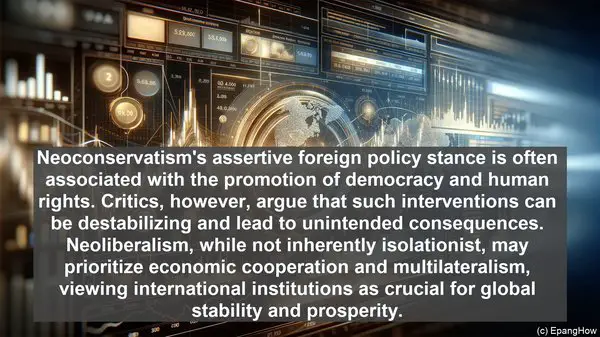Introduction: Ideological Frameworks
Greetings, audience! Today, we embark on a journey to explore the world of political ideologies, focusing on the contrasting realms of neoliberal and neoconservative policies. These ideologies, though often mentioned together, possess distinct characteristics that shape their respective approaches to governance and economics.
Neoliberal Policies: Embracing the Market
Neoliberalism, as an ideology, emphasizes the significance of free markets and limited government intervention. Advocates argue that market forces, when left unhindered, can efficiently allocate resources and drive economic growth. Privatization, deregulation, and reduced social spending are often associated with neoliberal policies. Proponents contend that such measures foster competition, innovation, and individual freedom.
Neoconservative Policies: Security and Intervention
In contrast, neoconservatism prioritizes national security and assertive foreign policy. Neoconservatives believe in a robust military, viewing it as a means to safeguard national interests and promote stability globally. This ideology often advocates for interventionist approaches, asserting that proactive measures can prevent conflicts and protect national values. Domestically, neoconservative policies may encompass traditional values and social conservatism.

Economic Perspectives: Neoliberalism vs. Neoconservatism
While both ideologies acknowledge the importance of economic growth, their approaches differ. Neoliberalism, with its emphasis on free markets, favors minimal government intervention, lower taxes, and reduced regulation. The belief is that such policies create an environment conducive to business expansion and job creation. On the other hand, neoconservatism may support government intervention in the economy, particularly in areas deemed vital for national security or strategic interests.
Social Welfare: Balancing Priorities
Neoliberal policies often advocate for limited social spending, contending that excessive welfare programs can create dependency and stifle individual initiative. Instead, they propose targeted interventions and market-based solutions. Neoconservatism, while also emphasizing self-reliance, may be more open to government involvement in social welfare, particularly when it aligns with national values or security concerns.
Foreign Policy: Approaches and Objectives
Neoconservatism’s assertive foreign policy stance is often associated with the promotion of democracy and human rights. Critics, however, argue that such interventions can be destabilizing and lead to unintended consequences. Neoliberalism, while not inherently isolationist, may prioritize economic cooperation and multilateralism, viewing international institutions as crucial for global stability and prosperity.

